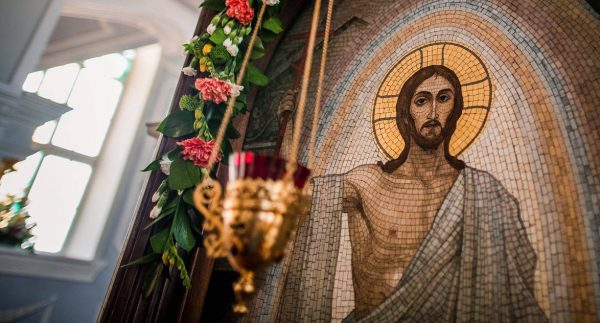For Christ, our Paschal Lamb, has been sacrificed. Let us, therefore, celebrate the festival, not with the old leaven, the leaven of malice and evil, but with the unleavened bread of sincerity and truth.” (1 Cor. 5:7-8)
Early in the morning on the first day of the week, when the sun had risen, the women disciples went to the tomb to anoint the body of Jesus. When they arrived, they found the tomb empty. To their amazement an angel of the Lord in brilliant white announced to them the good news: “You seek Jesus of Nazareth, who was crucified. He has risen! He is not here!” (Mark 16:6) The angel did not speak to them about an astonishing event that had occurred earlier, an event without content or purpose. He spoke to them of the person of Jesus himself, now risen and alive!
Mary Magdalene was the first witness to see the risen Christ (John 20:18). First she mistook Him to be a gardener and asked where the gardener might have removed the body. When Jesus said her name, “Mary,” she instantly recognized Him. She cried out, “Rabboni!” (“My dear Teacher!”). Later she announced the good news to the disciples who were hiding in fear. When she found them, she said: “I have seen the Lord!” (John 20:18)
When Jesus appeared to all the disciples a week later, including the doubting Thomas, among them, He challenged Thomas: “Put your finger here, and see my hands . . . do not be faithless, but believing!” (John 20:27) Thomas had previously refused to believe in the awesome event of the resurrection. Now, filled with wonder, he offered a ringing confession of faith that echoes in the hearts of Christians throughout the ages: “My Lord and my God!” (John 20:28) Thomas encountered the personal presence of Christ and he acknowledged Him personally as Lord and God.
And to Paul, the fanatical persecutor of the early Christians, as he was nearing Damascus, Christ appeared in a blinding light which cast him to the ground. Paul heard a voice speaking to him and saying: “Saul, Saul, why do you persecute me?” And Paul replied: “Who are you, Lord?” And He said, “I am Jesus!” (Acts 9:3-5)
The resurrection is a glorious past event of cosmic significance, a pivot in history wrought by God Himself, and which has changed the world. Yet the texts of the New Testaments direct us to the person of Christ, the risen Lord, as the essential mystery of the resurrection. The significance of the resurrection lies not only in its unprecedented and astonishing nature, but also, and above all, in that its content and purpose is the risen Christ in His gracious and glorious personal presence. He who had suffered and was dead, He is now arisen and alive! The Lord and Messiah had been killed, and slain as a Paschal Lamb for the salvation of the world, but He is now risen from the dead, a victor, alive, and active!
Many Paschal hymns invite us to celebrate the mystery of the risen Christ as a personal encounter with Him in prayer and worship:
Christ is the new Pascha, a living sacrifice,
the Lamb of God, who bears the sin of the world.
O Great and Holiest Pascha, Christ!
O Wisdom, Word, and Power of God!
Grant to us a most clear sign that we shall share with You
in the unwaning day of Your Kingdom!
Another hymn is equally stirring. The introductory verse is cast as a dialogue of the believer within his own soul, calling the soul to glorify the risen Christ: “Magnify, O my soul, Christ, the Life-Giver, who arose from the grave on the third day.” Then the hymn becomes a personal address to Christ:
O divine and beloved and most sweet voice!
You, O Christ, have truly promised that You would be
with us to the end of the ages.
Wherefore, we, the faithful, rejoice,
holding these Your words as an anchor of hope!
What difference does it make to think of the resurrection not only as an astonishing, event of the past, but also, and above all, as the risen Christ Himself, the Lord of glory, who is alive, present, and leading the Church and each one of us in the present? The difference is qualitatively immense because it is personal.
The glorious good news “Christ is risen!” challenges us to a personal encounter and personal communion with the risen Lord in order to shape our whole life around Christ’s presence and power, here and now. Christ said “Abide in me, and I in you.” (John 15:4) In the words of St. Paul: “It is no longer I who live, but Christ who lives in me; and the life I now live in the flesh I live by faith in the Son of God, who loved me and gave Himself for me.” (Gal. 2:20)
It is one thing to think about an awesome miracle in the history of the Church, and quite another to contemplate the mystery of the risen and living Christ, here and now, working in our own lives. It is one think to speak of the correct understanding of the doctrine regarding the truth of Christ and quite another to come to meet the risen and living Lord in heartfelt prayer and worship. It is one think to talk about the beauty of the Orthodox traditions and customs, and quite another to be personally receptive and transformed by the supreme content of those traditions: the presence of the risen and living Christ.
The Lord said “those who worship God must worship Him in spirit and truth.” (John 4:24) When we commit a sin, we ought to feel that we commit it before the presence of Christ, just as in the case of Peter when he denied Christ “and the Lord turned and looked at Peter.” Peter then came to his senses, repented and wept bitterly (Luke 22:56-62).
As we celebrate Pascha, let us celebrate the presence of the living Chris by “singing and making melody to the Lord with all our heart, always and for everything giving thanks to God the Father.” (Ephesians 5:19-20) As striving Christians, we stand or fall as true followers of Christ to the degree that, in faith and repentance, obedience and prayer, we allow Him to live in us, shine through us, and act through us by our words and deeds.
The best definition of a follower of Christ is: “A Christian is a person in whom Christ lives.” Christ does not replace our own self but rather He cleanses, sanctifies and transforms that self to full personal integrity and distinctiveness. Here is our true freedom, our experience of love and beauty, our life in sanctity and truth, our life becoming a sacrament of the presence of the living God. Christ is risen! Truly He is risen!

















